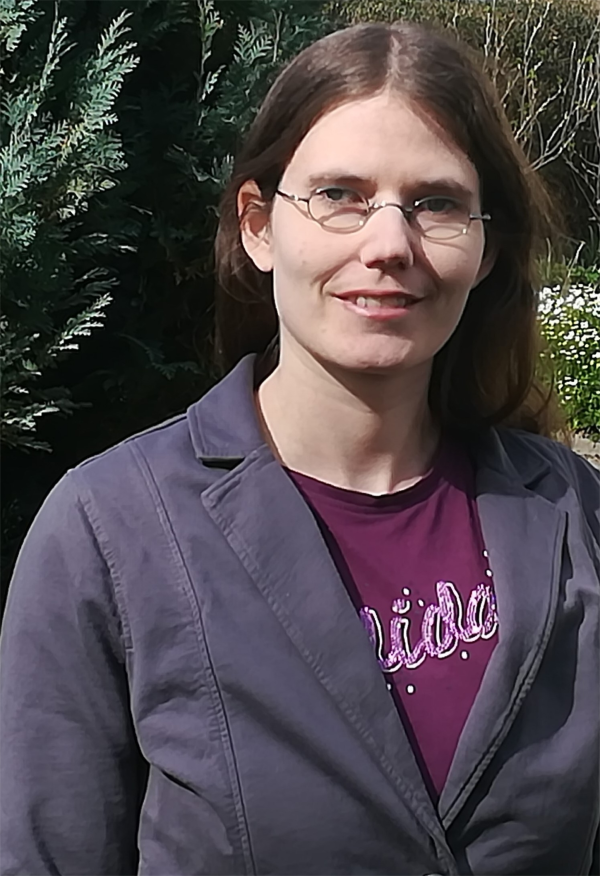Prof. Dr. Marie-Christine Jakobs
Professor, Reliable Software

Software and Computational Systems Lab
Department of Computer Science
Ludwig-Maximilians-Universität München (LMU Munich)
Oettingenstraße 67
80538
Munich
(Germany)
- Room
- 058
- lastname@sosy.ifi.lmu.de (You need to replace lastname.)
- ORCID
-
 0000-0002-5890-4673
0000-0002-5890-4673
GPG-Key
Please send me encrypted mails!
My GPG key: Public Key
Fingerprint: 78ED 2ABF EBA8 80FD 93DD B385 6C09 F182 7936 0D27
Short Biography
In 2012, Marie-Christine Jakobs finished her studies in computer science at Paderborn University. She received her doctor's degree in 2017 from Paderborn University. From 2017 to 2019 she worked as postdoctoral researcher at LMU Munich. From 2019-2023 Marie-Christine Jakobs was an assistant professor at TU Darmstadt. Since 2023 she has been a professor for at Ludwig-Maximilians-Universität München.Open Positions
We are currently hiring a research assistant, either on the level of a PhD student or a postdoctoral researcher for our DFG project ReVeriX. As a researcher in this project, you will work on innovative research questions with respect to efficient and flexible reverification of modified programs to safeguard modifed programs against
property violations.
For further details consider the job posting below.
Research
Marie-Christine Jakobs main research is in the area of formal methods for verification of software. She is particularly interested in automatic software verification with a focus on static analysis, model checking, and testing. She is interested in theoretical foundations as well as tool development. Since 2012 she has been contributing to the software analysis tool CPAchecker. Her current research interests include incremental verification, verifier combinations, test-case generation, functional equivalence checking, and the validation of verification results.Current Research Interests
- Incremental verification To increase the efficiency of reverifying a program after it has been changed, we want to utilize knowledge gained while verifying previous versions of the program. On the one hand, we aim to speed up reverification by reusing information discovered during the verification of an earlier version of the program. We are in particular interested to reuse information from different verifiers. On the other hand, we develop techniques that focus reverification on paths affected by the modification.
- Verifier combinations Verifiers have different strength and weaknesses. Therefore, we aim to combine different verifiers to get better verifiers.
- Test-case generation We use verification techniques to automatically generate test cases. More concretely, our approaches check the reachability of all test goals and output test cases for all goals that are proved reachable. Thereby, we focus on combinations of different verification approaches.
- Functional equivalence checking In this area, we develop methods to check whether original and modified program are functional equivalent. Our main focus is on techniques to encode functional equivalence into verification tasks that can be efficiently solved.
- Validation of verification results In this area, we work on formats that allow verifiers to provide evidence for their results and on approaches to independently check a verifier's results based on the provided evidence.
Publications
All my publications are available at DBLP and Google Scholar.Funded Projects (Current and Past)
- ConVeY - Continuous Verification of CYber-Physical Systems (DFG Research Training Group)
- ReVeriX: Efficiently Reverifying Modified Programs Despite of Switching the Verification Approach (DFG Project)
- Software Factory 4.0 (Part Project L, LOEWE project, HMWK, 2019-2022)
Currently supervised PhD students
Software Projects
Teaching
Thesis Topics and Projects
Typically, we offer thesis topics in the area of our current research. Below we list currently available topics. Further topics can be discussed on request. All topics offered by our chair are available on our teaching page.
Regular and Current Courses- Software Testing
- Verification of Parallel Programs
- Einführung in die Informatik: Programmierung und Softwareentwicklung für Nebenfach
- Bachelor and master seminars in the area of automatic software verification
- Oberseminar Zuverlässige Software
Regular Courses Taught in the Past
- Automatic Software Verification
- Seminar Advanced Approaches in Software Verification

